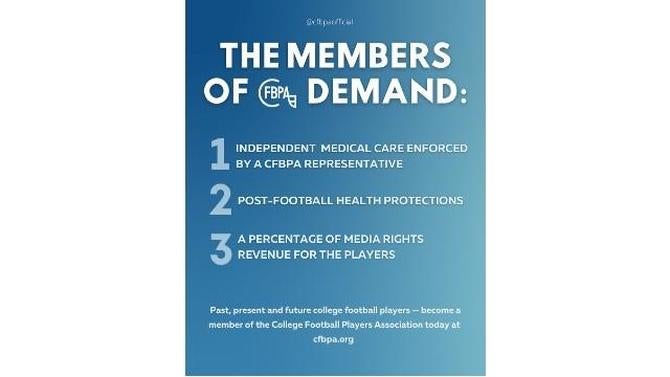
Sharing Big Ten Conference revenue with players is among a list of demands recently presented to the league by a college football players advocacy group CBS Sports has learned.
Penn State quarterback Sean Clifford has met with Jason Stahl, the executive director of the College Football Players Association. The CFBPA is a player advocacy organization formed in 2021. Stahl is a former faculty member at the University of Minnesota.
That meeting then led to sharing information with the Penn State team.
Stahl said he met with Penn State players secretly on campus from July 7-14.
Eventually news of the discussions reached Big Ten commissioner Kevin Warren. Stahl provided the list of demands to CBS Sports that he said went to Warren. They included enhanced medical care and “a percentage of media rights revenue for the players.”
Stahl said he and Warren spoke by phone for an hour on Thursday. In addition to players receiving a share of conference revenue from media rights, the demands include that players be allowed independent medical care separate from the school and post-eligibility “health protections”.
“We talked about all three demands,” Stahl told CBS Sports. “The first two of which, he seemed very open to movement toward our position. The third demand [regarding sharing revenue] I could tell it was going to be stickier, but it was going to be part of the conversation.”
Clifford confirmed the discussions Friday.
“Those three things are just the base of what we’d like to do. In reality, we think there is more that could happen,” Clifford told ESPN, which first reported a meeting between the two sides on Friday.
Stahl said he and Roxanne McCray, president of the CFBPA, have been invited to attend Big Ten Media Days next week in Indianapolis.
“The Big Ten Conference consistently communicates and collaborates with our student-athletes,” Warren said in a statement. “We are in the process of formalizing a student-athlete advisory committee to seek input from our student-athletes about the changing landscape of college athletics. We continue to work with our member institutions to ensure our student-athletes have an outstanding and well-rounded experience, while promoting and safeguarding the mission of higher education, and prioritizing excellence and integrity in both academics and athletics.”
With a new Big Ten television rights deal imminent, the thinking is there would not only be enough money to share with players but such an arrangement could even give the Big Ten a competitive advantage over other conferences.
“It’s not about the Big Ten and it’s not about Penn State – it’s about the entirety of college athletics needing reform,” Stahl said.
Stahl said his organization is not to be characterized as a union. It is a membership-based players association. However, Stahl added that if progress is not made with the Big Ten to voluntarily address the three demands, “we have the option of forming a union and attempting to unionize the entire Big Ten.”
“We are not a union,” Stahl stressed. “I had fantastic conversations with Kevin Warren that he was ready to talk with CFBPA about these three demands. We are going to exhaust that process before we consider other avenues.”
The conference is close to announcing a new media rights deal that reportedly could top $1 billion annually shared by the 14 Big Ten schools. (Sixteen when USC and UCLA join in 2024.) At a time when money and power are coalescing around the Big Ten and SEC, such a move would not only be a game changer for the league but for all of college athletics.
Warren has long been an advocate for college athletes having played college basketball and with his experience as a former agent. His brother Morrison was one of Stanford’s first Black football players.
Big Ten ADs have at least tangentially discussed the concept for at least six months according to a source. However, it’s not clear how much Big Ten ADs were looped in on the specific prospect of revenue sharing.
The words “collective bargaining” weren’t used in the list of demands but it is presumed that is what any revenue sharing discussion would have to include. Collective bargaining with players has long been discussed as unavoidable in college athletics in an era that includes NIL benefits and freedom to transfer.
“It’s more about, is this inevitable and unlike anything any of us have done for the last 25-30 years? … Let’s get ahead of it,” said a source familiar with the discussions.
College athletes’ scholarships are limited to room, books, board, tuition, cost of attendance and NIL benefits. Revenue sharing would bring athletes in the once-staunchly amateur NCAA closer to being considered “employees” than ever before.
No figures were available on what percentage of that Big Ten pot the CFBPA would demand. One source speculated that the Big Ten could avoid Title IX laws by distributing the money through the conference office instead of the schools. In that sense the conference office wouldn’t be an educational entity receiving federal funds necessarily subject to Title IX.
“Why should we be sharing revenue with an athlete who is not creating it?” said one source familiar with the discussions.
With collective bargaining, the two sides could conceivably have conversations about other issues. The NCAA this week announced that athletes could transfer as many times as they desired. That piece could be discussed over a bargaining session in return for a greater commitment from the players.


